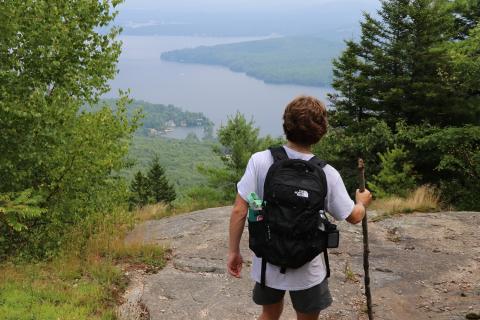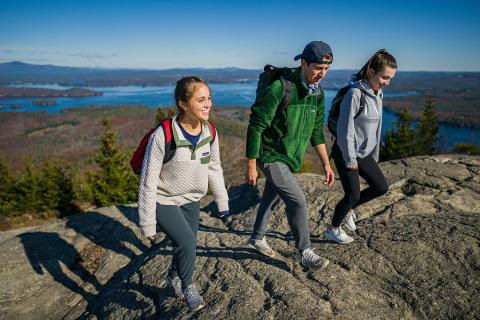Connecting the Dots
Almost every community in New Hampshire has some type of trail — whether it be a rail trail, riverwalk, snowmobile network, hiking or mountain biking loop, or path through a community forest. As literal and figurative connectors between people, places and experiences, trails are essential to the economic success of the Granite State and an important element of quality of life for New Hampshire people. Trails help connect people to nature, enable meaningful opportunities for health and social interaction and create appealing communities for locals and visitors alike.
Many groups care about trails and their maintenance, but, even in a small community, these groups may not know much about one another’s activities, and they may not have an opportunity to consider how to support one another. Tasks like project planning, grant writing, fundraising and volunteer management can be daunting endeavors, especially for members of volunteer-based organizations who may be short on time or have limited experience.
To address these issues and facilitate collaborative solutions, UNH faculty, graduate students, Extension staff and external partners joined forces in 2023 through an interdisciplinary working group referred to as “DIRT” (Developing Interconnections for Regional Trails). This working group combines interests in outdoor recreation, natural resource management, tourism and economic development, and workforce development. Funding comes from UNH’s Collaborative Research Excellence (CoRE) initiative.
Extension’s Community and Economic Development and Natural Resources specialists have worked with more than a dozen recreation-related organizations and businesses in the central region of New Hampshire, such as through the Foothills Foundation and Central NH Trails Roundtable gatherings. These regional stakeholders form a bedrock of engagement for DIRT, enabling the Franklin-Laconia corridor region to serve as a case study for the UNH team to better understand what community-based trail organizations need to build their capacity and reach their goals.
Through webinars, networking, collaborative workshops and brainstorming sessions, the DIRT team has aimed to provide trail organizations with access to customized education and resources, while simultaneously learning about their project needs and challenges. In 2024, DIRT hosted three webinars and three in-person workshops on topics including volunteer management, regional branding and identity and grant writing. All events were free and open to the public, featuring insights from community members representing a variety of organizations and businesses. DIRT program participants have also contributed to a crowdsourced resource list that includes grant opportunities, educational guides and more.

While the DIRT project’s roots are in Merrimack and Belknap counties, the workshops and events have attracted interest from across New Hampshire and even outside of the state. DIRT has convened representatives from trail organizations, outdoor recreation associations, community businesses, nonprofits, municipal planning boards and conservation commissions, along with several other interest groups to make lasting impacts in this region and beyond.
The DIRT research team is now using participant feedback from the educational and networking events, along with perspectives shared in interviews with trail organization leaders, to generate a report of key findings. The report will include recommendations for how institutions and organizations (such as UNH and Extension) can best support communities in their trail management efforts, especially through fostering knowledge-sharing and partnerships.
Research findings will help guide the development and effectiveness of future recreation planning collaborations across New Hampshire and potentially in other states, too, as the team of Extension specialists and UNH faculty share reports with colleagues in their national networks.
DIRT Initiatives
- Developing a regional mapping and signage strategy to communicate the public trails and outdoor recreation assets in the region and create better linkages with downtowns and businesses
- Leveraging online tools to highlight information about regional trails, addressing different abilities and types of recreational use
- Creating materials to support regional branding and promotional efforts
- Forming workforce development partnerships to create training opportunities for needed skills such as trail building




